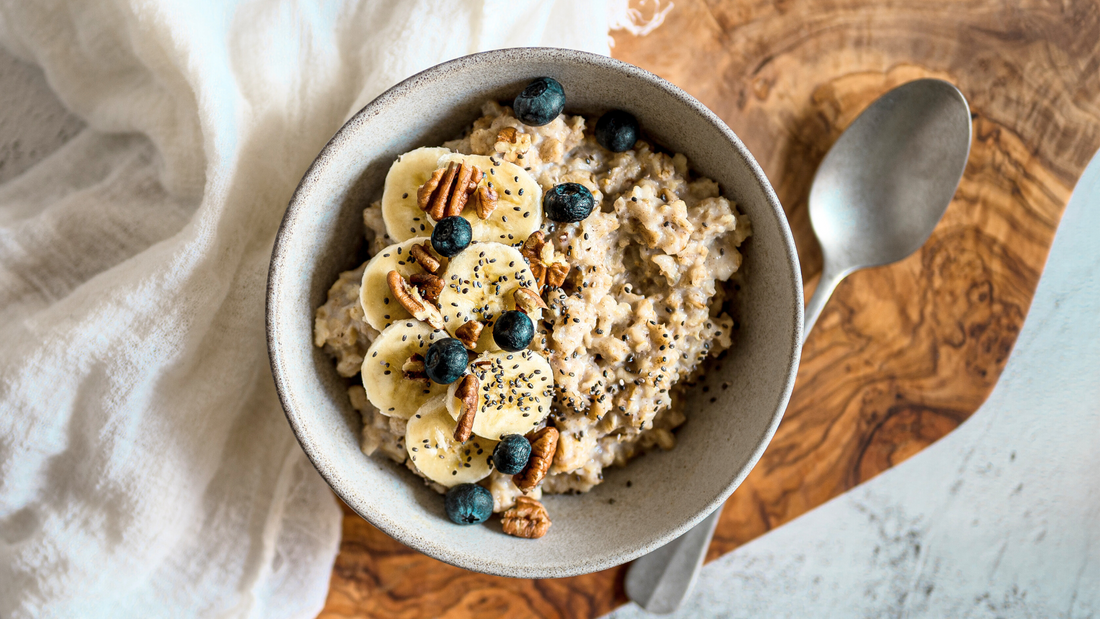Why Do Oats Bloat Me? How to Enjoy Oats Without the Stomach Pain

Why Do Oats Bloat Me? (And What You Can Actually Do About It)
It’s 2025 and let’s be real.. it feels like everyone’s starting their day with a big bowl of protein oats. They're filling, full of fiber, and loaded with plant-based goodness. But if you’ve ever sat there wondering, Why do oats bloat me? or Why do oats hurt my stomach after eating them?, you’re not alone.
For many of us (myself included), oats can leave us feeling... not so great. Think gas, bloating, and that uncomfortable fullness that lasts all day. The good news? There are real, science-backed reasons this happens and there are ways to enjoy oats without the bloat.

First: The Good Stuff …Why Oats Are Actually Healthy
Before we go blaming oats for everything, it’s important to understand what they do offer.
Oats are rich in a type of soluble fiber called beta-glucan, a prebiotic fiber that supports gut health by feeding beneficial bacteria in your microbiome. This fiber has also been studied for its ability to:
- Improve cholesterol levels
- Support blood sugar balance
- Enhance immune response
If you don’t believe me here’s the research
Oats also contain:
- Magnesium – involved in over 300 enzyme reactions in the body, including muscle and nerve function
- Iron – key for energy and oxygen transport
- Plant-based protein – a surprising 5g per half-cup dry
- Zinc – supports skin health and immune function
So yes, your favorite wellness influencer isn’t wrong when they say oats are “nutrient-dense.” But that doesn’t explain why so many of us still feel miserable after eating them.
So... Why Do Oats Hurt My Stomach?
Let’s talk bloating. While oats are technically low-FODMAP (meaning they shouldn’t aggravate IBS in small amounts), things change when you’re eating a large portion, or if your digestive system is already sensitive. I feel like I am calling myself out with that one.

Here’s what could be going on:
- Prebiotic fermentation: The beta-glucan fiber in oats is fermented in your colon by gut bacteria. This is normally a good thing — but if your microbiome is imbalanced or you’re sensitive to fiber, this fermentation process can cause gas, bloating, and discomfort
- Resistant starch: Oats contain resistant starch, especially when cooled. This can feed beneficial bacteria but may cause digestive upset in some people who aren’t used to it.
- Phytic acid: Raw or minimally processed oats still contain phytic acid, which can interfere with mineral absorption and contribute to bloating in some people.
- Portion size: Oats may be low-FODMAP in small amounts, but most of us go well beyond the recommended serving. A massive bowl of oats can push your digestive system into overdrive.
So no, you're not imagining things. That post-oatmeal bloat is real ,and your gut is trying to tell you something.
How to Make Oats Not Bloat You
If you’ve made it this far, you probably love oats and don’t want to give them up (trust me, I’ve been there). So the question becomes: How can I make oats not bloat me?
Here’s what has helped me… and what’s backed by science:
1. Ferment Your Oats
Fermentation is an ancient method that predigests fibers, breaking them down into simpler compounds that are easier for our bodies to absorb and tolerate. During fermentation:
- The phytic acid content is reduced, which helps with mineral absorption
- Beta-glucans are partially broken down, reducing the likelihood of excessive gas production
- Gut-friendly postbiotics are produced as a byproduct
This is why we ferment the oats in our granola at Eat Purposefully, to make them gentler on your stomach, while unlocking more of their nutrition.
2. Try Soaking or Sprouting
Soaking oats overnight in water or plant milk can also reduce some of the compounds that trigger bloating. Sprouting goes a step further ,activating enzymes that make the oats easier to digest and richer in available nutrients like B vitamins and antioxidants.
Also if you want to learn more about the differences between fermenting and sprouting I wrote about it here.
3. Start Small and Slow
If your gut is sensitive, easing into high-fiber foods like oats is key. Try starting with a ¼ cup serving and increasing slowly over time.
4. Pay Attention to Toppings
It’s not always just the oats. Flavored protein powders, sugar-packed granolas, and high-fructose fruit toppings (like bananas or dates) can all add fuel to the fire. Opt for low-FODMAP, gut-friendly toppings like:
- Chia seeds
- Cinnamon (bonus: it's anti-inflammatory!)
- Blueberries or strawberries
-
Gut-friendly granola (like ours!)

Final Thoughts: You Can Still Enjoy Oats (Without the Bloat)
If you've been wondering Why do oats make me bloated?, know that your experience is valid and that oats aren’t bad, they just need a little extra care for sensitive guts.
At Eat Purposefully, we created our fermented granola with exactly this in mind, combining nutrition with processes that make food easier to digest and actually helpful to your gut.
You deserve food that goes above and beyond for you ,no belly aches required.
